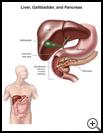
Fatty Liver Disease
________________________________________________________________________
KEY POINTS
- Fatty liver disease is a buildup of fat in the liver that can damage the liver cells.
- Treatment depends on what is causing the fatty buildup in your liver. Your treatment may include taking medicine, losing weight, avoiding alcohol, or controlling blood glucose and cholesterol.
- Ask your healthcare provider what symptoms or problems you should watch for and what to do if you have them. Make sure you know when you should come back for a checkup.
________________________________________________________________________
What is fatty liver disease?
Fatty liver disease is a buildup of fat in the liver. It is also called steatosis. The liver is one of the largest organs and an important part of your body. Some of the functions of the liver include:
- Helping your body get rid of some medicines and harmful substances
- Making bile, which helps your body digest fats
- Storing sugar, which your body uses for energy
- Making proteins, which are the building blocks for all cells in your body
What is the cause?
Fat is deposited in liver cells, which may affect how well the liver works. Different types of fatty liver disease have different causes.
- Alcoholic liver disease (ALD) is caused by drinking alcohol. ALD includes alcoholic fatty liver, alcoholic hepatitis (swelling or inflammation of the liver), and alcohol-related cirrhosis (scarring of the liver).
- Nonalcoholic fatty liver disease (NAFLD) is caused by obesity, diabetes, high cholesterol, poor diet, or other factors. It is not caused by drinking alcohol.
- Eating a high-fat diet alone does not cause fatty liver disease.
What are the symptoms?
With early liver damage, you may not have any symptoms, or the symptoms may be very mild.
Mild symptoms may include:
- Feeling tired
- Easy bruising
- Loss of appetite
- Weight loss
- Fever
- Nausea or vomiting
- Yellowish skin and eyes (jaundice)
- Itching
- Belly pain
More serious symptoms may include:
- Swelling of the belly, legs, or ankles
- Bloody vomit
- Bloody or tar-like bowel movements
- Confusion, memory loss, and trouble sleeping
- Coma
How is it diagnosed?
Your healthcare provider will ask about your symptoms and medical history and examine you. Tests may include:
- Blood tests
- An ultrasound, which uses sound waves to show pictures of the liver and gallbladder
- CT scan, which uses X-rays and a computer to show detailed pictures of the liver
How is it treated?
Treatment depends on what type of fatty liver disease you have and whether it has damaged your liver.
If you have fatty liver disease, you may need to:
- Lose weight
- Keep your blood glucose in good control
- Make changes to your diet to help lower cholesterol levels in your blood. Cholesterol is a type of fat. Your body makes some cholesterol and gets the rest from foods such as meats, dairy products, and eggs. Your healthcare provider or a dietitian may suggest changes to your diet.
- Take medicine to lower blood glucose or cholesterol levels.
- Avoid alcohol and other substances that harm the liver. Some liver problems caused by alcohol may be reversible if you quit drinking.
If the cause of fatty liver disease is not treated, the liver may swell (steatohepatitis) and form scar tissue (fibrosis). The damage may cause the liver cells to stop working, and you will not feel well. Over time, you may develop cirrhosis or cancer leading to liver failure, which is life threatening.
If you are very sick, a liver transplant may be an option. Talk to your healthcare provider about whether a transplant is an option for you.
How can I take care of myself?
- Follow the full course of treatment prescribed by your healthcare provider. You need to avoid taking medicines that can damage the liver more such as acetaminophen. Ask your provider which medicines you can take safely for symptoms such as itching and nausea.
- Follow the diet recommended by your provider.
- Don’t drink alcohol or use illegal drugs.
- Ask your provider:
- How and when you will get your test results
- How long it will take to recover
- If there are activities you should avoid and when you can return to your normal activities
- How to take care of yourself at home
- What symptoms or problems you should watch for and what to do if you have them
- Make sure you know when you should come back for a checkup. Keep all follow-up appointments.
How can I help prevent fatty liver disease?
- If you want to drink alcohol, ask your healthcare provider how much is safe for you to drink. If you need help to stop drinking, get help from a counselor or Alcoholics Anonymous (AA).
- Ask your healthcare provider about vaccines to prevent hepatitis, another liver disease.
- Eat a healthy diet and get regular exercise according to your provider’s recommendation.
- Follow your healthcare provider’s advice about medicine and other treatments for high blood pressure, high cholesterol, diabetes, or other medical problems.
- Take only the medicines you need as directed by your healthcare provider.
- Lose weight if you are overweight, and keep a healthy weight.
- Get regular checkups as often as recommended by your healthcare provider. A checkup will include tests for liver function and blood glucose levels.
You can get more information from:
- American Liver Foundation
800-465-4837
http://www.liverfoundation.org

